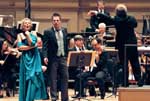
Some musicians take the breath away simply by their sheer industry: Daniel Barenboim, for instance, now 57 and a driven overachiever since his prodigy days. Although he has never made New York City a major focus for his multiple activities as pianist, conductor, chamber musician, accompanist, teacher, and opera impresario, anyone who may have felt deprived of this mercurial presence over the years has just had ample opportunity to catch up. Carnegie Hall recently presented Barenboim in one of its ambitious “perspectives” showcases, designed to display as many facets of such factotum musicians as possible.
To lead off his marathon, Barenboim conducted his own orchestra, the Chicago Symphony, in three programs featuring symphonies by Mahler and Bruckner; the maestro himself as soloist in Mozart’s Piano Concerto, K. 365; and the local premiere of Elliott Carter’s new one-act opera, What Next? Without a breather, Barenboim then plunged into a three-day workshop for pianists and conductors, teaching sessions that culminated in a concert with the Civic Orchestra of Chicago. Later on, he found time to play Schoenberg’s Piano Concerto with the London Symphony under Pierre Boulez, spend an evening discussing his career with author and critic Edward Said, and make himself available for interviews and informal post-concert greenroom meetings with the audience.
If pressed to highlight one event from this dizzy round, I would opt for What Next? by Carter, himself a musical phenomenon even more amazingly industrious than Barenboim. After all, how many composers of equal fame and prestige write their first opera at the age of 90? Besides, the plot, such as it is, touched me in a personal way. An absurdist conversation piece concocted by Paul Griffiths, a New York Times music critic and avid Carter partisan (obviously untroubled by any possible conflict of interest), the text deals with the reactions of six people moments after a catastrophic accident of some kind. Since I was just easing myself back onto the music beat after a bad fall and surgery, that subject struck a raw nerve.
Of course, this is opera and not real life, so I suppose to that extent it’s possible to accept the disheveled nature of the work and the confused ramblings of its disoriented characters: a bride and groom, an aging hippie, a mother, a lady astronomer, and a young boy. Still, I could never quite shake the feeling that the flaky language and tricky wordplays only mask a text more notable for its feeble wit and pretentious metaphorical posturing than for any real literary distinction. No matter. There are certainly worse librettos, and this must have been exactly the one Carter wanted, since apparently he was an active, interventionist collaborator during the early development stages, no less so than such experienced opera composers and librettist-hounders as Verdi and Puccini. In any case, the rapid verbal volleys mirror the metrical intricacy and linear angularity of Carter’s familiar style, which becomes increasingly lucid and transparent as the composer approaches his second century – the sheer energy of this nonagenarian’s musical invention never ceases to astonish.
Barenboim conducted the premiere of What Next? in Berlin last September, and he brought most of the original cast with him to Carnegie Hall: Simone Nold, Hanno Müller-Brachmann, Lynne Dawson, William Joyner, Hilary Summers, and Michael John Devine. He also acted as a genial compère before the performance began, introducing the characters, giving clues as to who they might be, and hinting at what might be on their minds. Despite that helping hand, the stunning orchestral playing, and flashed supertitles above the orchestra, the opera finally emerged as little more than a curio, a theatrical abstraction for Carter connoisseurs only.